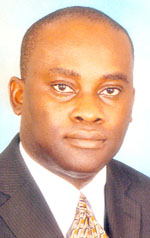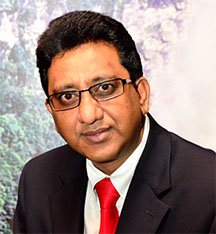Aside from the Constitution explicitly requiring that elections be held within three months of government’s collapse on the passage of a no-confidence motion, Senior Counsel Stanley Marcus says in the same vein, the supreme law also caters for that time to be extended.
Marcus was at the time presenting arguments before acting Chief Justice Roxane George-Wiltshire SC, on behalf of the Guy-ana Elections Commission (GECOM), whose current house-to-house registration exercise is being challenged by chartered accountant Christopher Ram.
At the hearing yesterday afternoon, Marcus advanced that one could not approach the court for an order compelling GECOM to execute elections by a certain time, as it is the President alone, in any event, who would have to announce a date for elections.

Referencing the recent Caribbean Court of Justice (CCJ) judgment which pronounced the no-confidence motion against the David Granger-led administration to have been validly passed and by which Article 106 (6) of the Constitution became immediately engaged, Marcus made the argument that subsection (7) of that Article must also be given weight.
He sought to make the argument that while the first part of the provision is often cited as having been declared by the CCJ to be given effect, the Trinidad-based court, Guyana’s final appellate court, also cited subsection (7) in its ruling that it would be making no coercive orders in relation to giving government a date on which to hold elections.
Marcus reminded that the CCJ had said that it would not get involved in politics, but expressed hope that both the government and opposition would respect the Constitution and act with integrity.
The Senior Counsel expressed the position that part of the two sides acting with integrity and in good faith, given that GECOM has indicated that the registration exercise would not be completed before September 18th – by which the Opposition is calling for elections, would be for them to return to the National Assembly to seek an extension of time.
Article 106 (6) of the Constitution says Cabinet, including the President, shall resign if the government is defeated by the vote of a majority of all the elected members of the National Assembly on a vote of confidence.
Meanwhile, Article 106 (7) adds, “Notwithstanding its defeat, the Government shall remain in office and shall hold an election within three months, or such longer period as the National Assembly shall by resolution supported by not less than two-thirds of the votes of all the elected members of the National Assembly determine, and shall resign after the President takes the oath of office following the elections.”
On this point, counsel argued that the framers of the Constitution must have envisioned that there may exist the situation where elections within the three-month timeframe is not possible and so inserted the proviso in subsection (7).
He said that consequent on elections not being possible within three months, that proviso becomes engaged, which was also implicit in the ruling handed down by the CCJ. The court’s ruling, he argued, must be looked at holistically.
Opposition Leader Bharrat Jagdeo has repeatedly said that the Parlia-mentary Opposition would not be returning to the House to grant any extension of time for the holding of polls.
‘A very dangerous place’
Meanwhile, also argued yesterday during the almost five-hour hearing, was GECOM’s application, citing possible bias, that the Chief Justice recuse herself from hearing the challenge. Marcus’ application was made on the basis that Justice George had previously issued a press release that allegedly contained “certain statements which raise the likelihood of bias” on her part.
Attorney Anil Nandlall, who represents Ram, however, rubbished Marcus’ advancements, stating that the application is really not GECOM’s, but Marcus’ as it was made during the period that GECOM was not fully constituted, as it was without a chairperson.
He said, too, that there was no meeting with the commission and so Marcus’ notice of application would have been without authority and therefore a nullity, while adding “Mr Marcus is in a very dangerous place.”
Marcus’ contention has been that the Chief Justice’s pronouncement of her interpretation of the CCJ ruling being that elections should be held no later than September 18th, 2019 – three months from June 18th when the court would have rendered its ruling, amounts to bias.
Citing case law, however, Nandlall said that counsel – especially one of silk – could not just make an allegation of bias against a judge. He said that there must be shown some pecuniary or personal interest which the judge may have in the outcome of the matter, and even that alone would not amount to bias.
Nandlall said that with the advancements raised by Marcus, no fair-minded observer would come to a conclusion of bias. As a matter of fact, the lawyer argued, if anything, it is his client who should not want the Chief Justice to hear his case, as she had denied him a stay he was seeking on the registration exercise – ruling against the applicant and presumably in favour of the respondents.
Nandlall opined that all the judge would have done was gave her interpretation of the ruling delivered by the CCJ as judges often do. He said if that interpretation is proven to be inaccurate, an aggrieved party can simply appeal citing an error of law the judge would have made, a practice which he said is ever so often done.
Counsel described Marcus’ application as frivolous, vexatious and called for it to be dismissed with costs.
Arguing against the current house-to-house registration process, Nandlall said that the process of continuous registration would be sufficient to cater for sanitising the voters’ list, into which new voters can be fed into the existing database and non-existent ones taken off.
He opined that the current registration process being resorted to by the GECOM was so done with the commission knowing full well that it would not afford it the execution of elections no later than September 18th.
According to Nandlall, the wholesale scrapping of the list amounts to a “colossal violation” of what the law provides for and of the letter and spirit of the CCJ ruling.
Updated
Attorney Roysdale Forde, who represents Chief Election Officer Keith Lowenfield, argued, however, that the current registration exercise embarked upon is important to the conduct of “free, fair and credible elections.”
Referencing several pieces of legislation, Forde said that electors residing in each area will be updated to the list during the registration exercise when enumerators visit their homes. He initially sought to advance that a person would only be de-registered if they are not found to be there/living there anymore.
This, however, caused the Chief Justice to make known her observation, for which she quizzed Forde, on what would be the outcome in situations where persons may not be at home because as is the case with many Guyanese, while they may live in the city or its environs, they work in outlying areas.
She cited as an example, persons who may be working in interior locations, but live in Georgetown. “What happens when enumerators visit their homes and they are not there?” the Chief Justice asked.
Forde then sought to explain that such persons would not just be taken off the list in an ad hoc manner, as a claims and objections period would be available to them.
But the judge also questioned what would be the outcome if such a person, in the first place, is unaware that they may have even been taken off the list.
Counsel maintained that it would be for that person to ascertain their status during the claims and objections period.
The hearings will continue on Monday morning at 9, when the Attorney General will present his arguments to the court.
In its decision of June 18th, the CCJ ruled that with the passage of a no-confidence motion against the APNU+AFC government being valid, the clear provisions of Article 106 immediately became engaged.
While it has been government’s position that the house-to-house registration exercise is an important prerequisite to the holding of credible elections, both Ram and the opposition PPP/C say it would be in contravention of the Constitution.
Ram, also an attorney and political commentator, argues that the house-to-house registration exercise is being undertaken in violation of the Constitution, which requires the holding of elections within three months of the passage of a no-confidence motion against the government. The motion was passed on December 21st last year.
Ram’s position is that the registration exercise is in violation of the letter and spirit of the Constitution and the judgment and consequential orders made by the CCJ in the consolidated cases stemming from the passage of the no-confidence motion.





